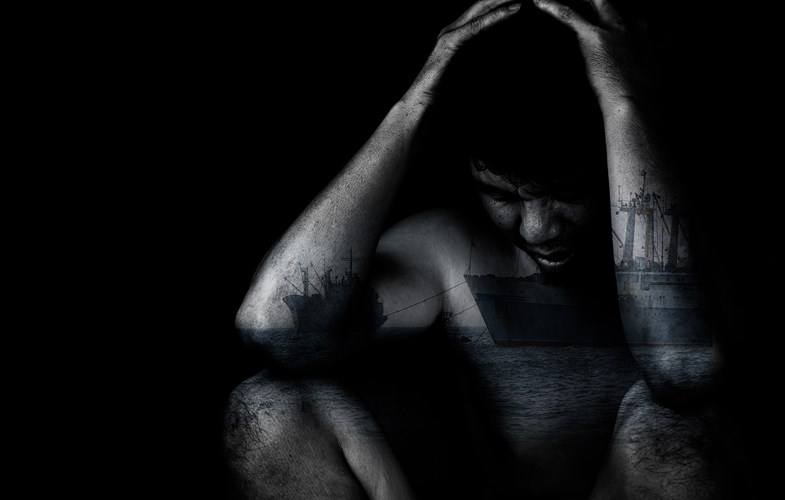

Not only marine life such as sharks are threatened by fishing, the rights of people working in the fishing industry must also be protected
Human rights in fisheries
Shark protection = protection of human rights
Human trafficking, slavery, mistreatment, poor working conditions, no pay, insufficient supplies and much more are part of everyday life on many fishing vessels. Due to greed for profit, increasing demand for cheap fish and rapidly declining fish stocks, the fishing industry resorts to highly questionable methods.
Not only are the sea and its resources exploited by means of illegal, unreported and unregulated fishing (IUU), but also the workers on the vessels. The aspects of human rights violations in the fishing industry are manifold and the interrelationships complex. But IUU and human rights violations in fisheries can be prevented by the same means.
As the ocean and most fish stocks are almost or now already completely overfished, the fishing industry is becoming increasingly creative in order to remain profitable. IUU fishing can still make a difference at the expense of the health of fish stocks and the entire marine ecosystem. It is not uncommon for such vessels to engage in shark finning, the targeting of protected shark species or even marine mammals such as dolphins. In the same breath, the workers on such ships are often exploited on a massive scale. Crew costs account for up to 60 % of the ship's expenses. It is therefore not surprising that fishery operators see a high potential for savings here. No means seems to be taboo for higher profits and a competitive advantage. The ones who always suffer are the workers, often migrant workers and those from third countries, who are hired in the hope of finding better working conditions and higher wages than in their home countries.
Fishing vessels are subject to the conditions of the flag under which they sail and the countries whose ports they call at. Some of these countries' conditions and laws encourage human trafficking and inhumane treatment of workers on board. The impact of human rights violations is far-reaching and varied:
- Legal loopholes oblige captains to detain workers without entry visas on board the ship and confiscate their passports. Accordingly, considerable pressure is exerted on the workers, obviously encouraging human trafficking.
- Working days of up to 20 hours, spread over several shifts of different ships
- Little or no pay
- Insufficient supply of food and drinking water
- Sexual assault
- Threats and use of violence; kicks, beatings and even murders.
This list could well go on.
One of the measures to ensure compliance with the regulations regarding fishing activities, but also with respect to human rights, is the deployment of so-called observers. Observers are officially appointed control bodies that are supposed to control and document any violation of applicable laws and guidelines on board the vessels, i.e. IUU fishing such as catch quotas, catching of protected species, use of prohibited fishing methods or shark finning, and also violations of human rights. In theory, this is a good approach and, from Sharkproject's point of view, also an important building block, as long as the observers can do their work unhindered. So far, however, observers have only been deployed on a random basis, which does not guarantee complete monitoring. But where IUU fishing and human rights violations are knowingly carried out, observers who are supposed to document these violations are just as endangered as the workers on these vessels.
Both IUU fishing and human rights violations within fisheries can be solved in the same way. Transparent and complete monitoring of all fishing activities worldwide is needed. In addition to the mandatory deployment of observers on every voyage, there are already technical solutions that can contribute to this. To this end, Sharkproject is working together with other NGOs at national and international level to influence the important decision-makers.
What exactly is meant by IUU can be read here in our article on this topic.
Goal
By means of social media campaigns, support of partner campaigns or signing open letters, Sharkproject tries to exert political influence and inform the public.
Duration
Sharkproject will continue to advocate on this issue until the necessary changes and adjustments in the fishery have been implemented.
Links
Human Rights at Sea: https://www.humanrightsatsea.org
Environmental Justice Foundation: https://ejfoundation.org/de/was-wir-tun/ozeane/sklaverei-auf-see
Convention 188 - Work in Fishing Convention: https://www.ilo.org/wcmsp5/groups/public/---ed_norm/---normes/documents/normativeinstrument/wcms_c188_de.htm
Independent report on one of the most high-profile cases in recent years. The death of an observer on the vessel Win Far No 636: https://www.humanrightsatsea.org/2021/05/19/death-at-sea-independent-case-review-of-kiribati-fisheries-observer-eritara-aati-kaierua/
Article from The Guardian from 2021 on this case: https://www.theguardian.com/world/2021/jun/20/death-at-sea-the-fisheries-inspectors-who-never-came-home

© Adobe Stock Yupachingping Bborriss
